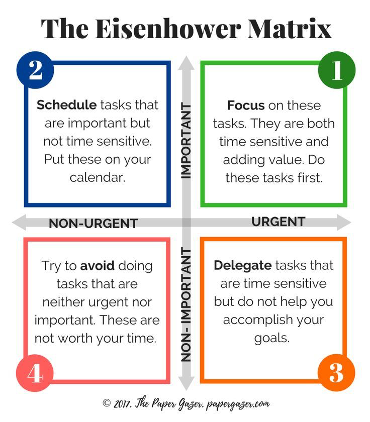We Like Ike
Dwight David Eisenhower. 34th president of the United States. Supreme Commander of the Allied Forces in Europe. Brought the term military-industrial complex into the vocabulary. All in all, a pretty busy guy for much of his career. He did a lot of things and made a lot of decisions. And regardless of if you agree with those things or his decisions, one of the other things he gave us was a framework for deciding what needs to get done when.
It’s not perfect, and of course, like all decision frameworks, there’s some judgement needed, but what it does have is simplicity. Just take each problem/task/decision and map it on two axes. Urgency and Importance. Because, “What is important is seldom urgent and what is urgent is seldom important.”
Urgency is about timeliness and deadlines. Given the delta-V of your rocket, there’s a launch window in 24 hours. Use it or not? That window will close whether you launch or not. The next opportunity will be in a few days/weeks/months/years, but there will be one. In this case, to quote Geddy Lee, “If you choose not to decide, you still have made a choice.”
Importance, on the other hand, is about the long term impact of the thing, and how much time/effort/money it will take to change later. Getting the hardware design right before you make a million of something is important. Back when software was delivered in a box, making sure the gold master you sent to the duplicator was about as important a choice as you could make.
So once you’ve got the two axes, plot them out.

The highest priority things are up and to the right. Urgent and Important. Do those first. And make sure they’re done. These are the crisis. If you don’t at least mitigate them something really bad will happen.
Next are the important ones that aren’t urgent, the top left. You want to get those things scheduled so you have time to give them the attention they need, before they end up in the top right. And by scheduled, I don’t mean schedule the crisis. I mean schedule the time you’re going to work on them and make sure they get done.
Then there’s the urgent things that aren’t as important. The key is less important, not unimportant. Can you get help on them? Is there someone better to make sure they get done? Find someone to help you work them in parallel with the other things on your list.
Finally, there are the non-urgent, unimportant things. These are the things that you try not to do. Requests that aren’t yours to resolve. Just say “No.”
One important thing to remember though. Just because you don’t think it’s important or urgent doesn’t mean it isn’t. The classification isn’t just about you and your wants/desires. You need to keep other’s priorities and your own biases in mind while classifying things. If you don’t, you end up in a silo. And you probably don’t want that.
